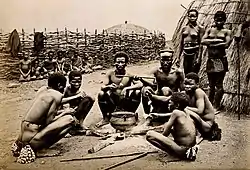Hlubi
Les Hlubi (ou AmaHlubi) sont un groupe ethnique bantou d’Afrique australe, la majorité de la population se trouvant dans les provinces du KwaZulu-Natal et du Cap oriental en Afrique du Sud.

Ethnonymie
| Singulier (une personne hlubi) | iHlubi |
| Pluriel (le peuple hlubi) | amaHlubi |
| Langue (la langue hlubi) | isiHlubi |
Histoire
Les Hlubi parlent un dialecte proche de la langue swazi, une des langues Tekela de la branche des Nguni dans la famille linguistique du Niger-Congo. Ce dialecte est de nos jours très menacé, la plupart des locuteurs Hlubi étant âgés et analphabètes. Il y a toutefois quelques tentatives d'intellectuels pour le conserver et en faire l’une des onze langues reconnues d'Afrique du Sud[2].
Liste des rois des Hlubi
Ci-dessous, un récapitulatif de tous les rois Hlubi ayant régné depuis 1300 jusqu'à nos jours[3]. Noter que l'histoire de ce peuple a été principalement transmise sous forme orale et que pour les dates les plus anciennes les données peuvent être partiellement erronées[4].
| Roi | Règne |
|---|---|
| Chibi | 1300–1325 |
| Lubelo | 1325–1350 |
| Busobengwe (Bhungane I) | 1350–1370 |
| Fulathel’ilanga | 1370–1390 |
| Bhele | 1390–1410 |
| Lufelelwenja | 1410–1430 |
| Sidwaba (Nkomo) | 1430–1450 |
| Mhuhu | 1450–1475 |
| Mpembe | 1475–1500 |
| Mhlanga | 1500–1525 |
| Musi | 1525–1550 |
| Masoka | 1550–1575 |
| Ndlovu | 1575–1600 |
| Dlamini | 1600–1625 |
| Mthimkhulu I | 1625–1650 |
| Ncobo | |
| Rhadebe | –1675 |
| Dlomo I | 1675–1710 |
| Mashiya | 1710–1720 |
| Ntsele | 1735–1760 |
| Bhungane II | 1760–1800 |
| Mthimkhulu II (Ngwadlazibomvu) | 1800–1818 |
| Mpangazitha (Pakalita) | 1818–1825 |
| Mahwanqa (Regent) | 1825–1839 |
| Dlomo II and later, Mthethwa (commonly known as Langalibalele I) | 1839–1889 |
| Siyephu (Mandiza) | 1897–1910 |
| Tatazela (Mthunzi) | 1926–1956 |
| Muziwenkosi (Langalibalelle ll) | 1974 – |
Notes et références
- (en) JOCHEN S. ARNDT, Struggles for Land, Language and Identity in Post-Apartheid South Africa, The Case of the Hlubi, Virginia Military Institute, , p. 1
- Submission to the Commission on Traditional Leadership Disputes and Claims: Draft 1, July 2011
- « Isizwe SamaHlubi: Submission to the Commission on Traditional Leadership Disputes and Claims: Draft 1 », (consulté le )
- Genealogy
Bibliographie
- Henry Masila Ndawo, Iziduko zama-Hlubi, Lovedale Press, (lire en ligne)
- Henry Masila Ndawo, Ibali lama Hlubi, Lovedale Press, (hdl 10962/47224)
- Andrew Hayden Manson, The Hlubi and Ngwe in a colonial society, 1848–1877, s.n. (lire en ligne)
- Alfred T. Bryant, Olden times in Zululand and Natal: containing earlier political history of the Eastern-Nguni clans, C. Struik, (lire en ligne)
- John Henderson Soga, The south-eastern Bantu: (Abe-Naguni, Aba-Mbo, Ama-Lala), The Witwatersrand university press, (lire en ligne)
- John Britten Wright et Andrew Manson, The Hlubi chiefdom in Zululand-Natal: a history, Ladysmith Historical Society, (ISBN 978-0-620-06178-0, lire en ligne)
- John William Colenso, Langalibalele and the amahlubi tribe: being remarks upon the official record of the trials of the Chief, his sons and Induna, and other members of the amahlubi tribe, (lire en ligne)
- Paul Maylam, A history of the African people of South Africa: from the early Iron Age to the 1970s, St. Martin's Press, (ISBN 978-0-312-37511-9, lire en ligne)